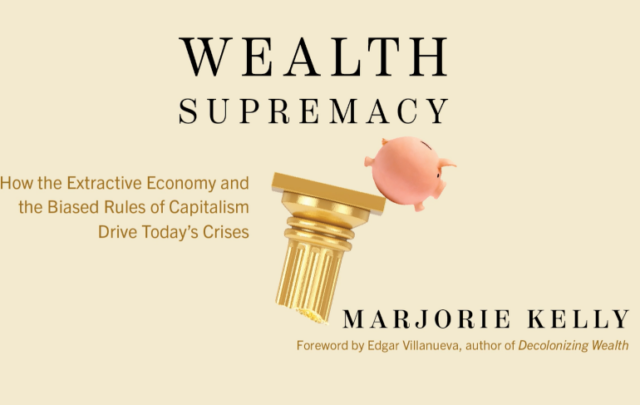
Trade treaties were a hot button issue during the recent US presidential primary campaigns. This represents an important victory for the people – for the grassroots – whose voice is finally being heard. While it’s hard to know what really lies behind Donald Trump’s opposition to the trade agreements, it’s very significant that Bernie Sanders put Hillary Clinton on the defensive about NAFTA and led her to take a stand against the TransPacific Partnership (TPP). In rejecting these trade deals, political leaders are going against the top-down pressure from global corporations and banks. We must of course be alert to the fact that politicians pander to voters while seeking election, but once in power they only seem to hear the voice of big money. Nevertheless, the fact that awareness about the trade treaties has become so widespread is itself a huge victory. Now that these corporate-friendly deals are seeing the light of day, it is unlikely that future trade agreements will be easy, automatic victories for global capital.
In the UK, meanwhile, another fierce debate is underway: voters in Britain will soon decide whether or not to remain in the European Union. Although this issue parallels – and is in fact linked to – the debate around trade treaties, most voices in favor of Brexit seem to offer little more than narrow nationalism, xenophobia and racism. Such associations make it feel impossible for most Greens and progressive thinkers on the left to vote ‘Leave’ in the upcoming UK referendum.
And that settles it in the minds of some: one ‘has’ to vote ‘Remain’. Anything else feels ‘unprogressive’, reactionary, even downright dangerous.
However, there are powerful arguments against the European Economic Union. In all five Nordic countries – Iceland, Norway, Sweden, Finland and Denmark – there has been a very powerful critique of the EU from an ecological, cultural, global solidarity and democratic perspective. A large proportion of the population in those countries realized that the impetus to link countries together was primarily based on a misguided notion of economic growth. However, these arguments didn’t reach the English-speaking world, and today on both sides of the debate in Britain this misguided notion continues to prevail.
In order to make sense of misleading pro and con arguments in the media, we need to go behind the scenes to examine the issues holistically. We need to look carefully at the process of economic ‘integration’ that has been going on for several generations now around the world.
At the regional, national and global level, societies and ecosystems have been transformed in order to accelerate economic growth. The emphasis has been on increasing international trade and benefits to international traders, at great cost to ecosystems, livelihoods, and democracy. It is important to understand the formation of the EU in this context, but by no means do the points we make here apply to the EU alone.
The EU is dedicated to corporate interests and economic globalization
The European Union is an extension of the Bretton Woods institutions – The World Bank, the International Monetary Fund (IMF), and the General Agreement on Tariffs and Trade (GATT).
It is widely assumed that the European Union was formed in order to prevent conflict and in order to avoid another depression. In the aftermath of the Second World War, political elites and business leaders promoted the notion that economic integration was a path to peace and harmony.
But the result was a form of economic development – based on debt, global trade and consumerism – that systematically undermined democracy and favored corporate interests while hollowing out local economies worldwide. In country after country, transnational corporations (TNCs) have been able to evade taxes by ‘offshoring’ their activities, and to bargain for lower tax rates and higher subsidies by threatening to move where even less in taxes will be demanded, and more in subsidies provided.
Today, interlinked multinational banks and corporations constitute a de facto European government, determining economic activity through the ‘European market’. Their vast lobbying power has an overwhelming influence on the EU Commission and the secretive Council. In other words, corporations run Europe.
Economic integration imposes human and ecological monoculture
Europe is home to a great variety of cultures, languages and customs. The economic union is based on an economic model that is eroding this diversity, which was born of human adaptation to different climates and ecological realities. A fabric consisting of mutually enriching and different cultural traditions is being replaced by the uniform culture of consumerist ‘individualism’.
Previously, the many borders, currencies, and differing regulations made trade difficult for big business, while the diversity of languages and traditions put limits on mass marketing. None of these were obstacles to businesses operating within their own countries – in fact, the borders and cultural diversity helped protect the markets of domestic producers from the predations of mobile capital, helping to ensure their survival.
But for big corporations and financial institutions, diversity is an impediment, whereas monoculture – in all aspects of life, from seeds, fast food and clothing, to architecture – is ‘efficient’. For them, a single Europe-wide market of 500 million people was an essential step to further growth: their growth.
Meeting that goal required a single currency, ‘harmonized’ regulations, the elimination of borders, and centralized management of the European economy.
The EU economy increases pollution and CO2 emissions
The global economic model promoted in the EU increases pollution and fossil fuel use in a multitude of ways.
- First of all, economic policies are responsible for a concentration of jobs in ever-larger high-rise urban centers. When people move into urban areas, net resource and energy consumption tends to rise, massively increasing CO2 emissions and toxic pollution.
- Secondly, the EU subsidies system not only wipes out family farms but paves the way for agribusinesses that destroy soils and ecosystems, or employ cruel factory farming methods.
- Thirdly, investments in infrastructure and fossil fuel subsidies help to prop up the energy-intensive system of mass production for mass consumption. Moreover, most energy subsidies tend to support highly centralized power systems, rather than more decentralized renewable energy.
Even worse is ‘redundant trade’: in a typical year, Britain exports millions of liters of milk and thousand of tonnes of wheat and lamb, while importing nearly identical amounts. The cod caught off the coast of Scotland is shipped 5,000 miles to be turned into fillets in China, then shipped back again.
This kind of wasteful trade – which greatly overshadows the efforts of well-meaning individuals to reduce their personal carbon footprints – actually benefits no one but massive corporations. And it is not efficiency but a wide range of subsidies and ignored costs that make it all possible.
National governments stripped of political power
At the same time as governments subsidise big business, they must pay from their depleted treasuries to retrain displaced workers, to mend the unraveling social fabric, and to clean up the despoiled environments left behind by deregulated, mobile corporations.
Forced to go hat-in-hand to banks, countries can easily find themselves on a downward spiral, with interest payments consuming an increasing proportion of national output. It’s no wonder that so many governments today are struggling to stay afloat, while global corporations and banks are flush with cash.
This has left nation-states increasingly powerless to deliver what people need. They have lost the power to protect their citizens from the impacts of international capital and financial speculation. As a result, many people have lost confidence in governments and democracy itself. They feel disenfranchised and angered by the escalation of inequality-driven by international market forces and rootless, profit-hungry corporations, with the full complicity of the EU.
This is a dangerous situation, ripe for exploitation by extremist forces, including those of atavism and of outright fascism.
European government is not the answer
Many idealists see the EU as a political bloc that has raised environmental and human rights standards continentally and globally, and acted as a buffer to the United States. There is much truth in this. And to greatly strengthen pan-European collaboration with the aim of solving our global ecological and human rights problems is clearly highly desirable.
However, this type of collaboration does not need to – ought not to be allowed to – erode the rights of smaller nation states to run their own affairs under clearly negotiated agreements of environmental protection. We hold that the relatively high standards in the EU have been a consequence of the integrity of the democracies in many of the constituent countries, not a consequence of creating a single market that benefits big business.
We would also argue that to assess the overall contribution by the EU to global environment and human rights affairs we must not look exclusively at the relatively benign EU policies in these areas themselves but also at the consequences for ecological justice of EU policies in trade and military policy.
In fact, the main impetus behind the European Economic Union was the desire of big business to compete with the US. And to a great extent, what we have today is a nascent United States of Europe, competing with the US about market shares but also working closely together with the US in preserving the hegemony of the global North over the global South.
European democracy? If only …
Meanwhile, within the EU, the public has very little power and ability to affect decisions. There is no common public sphere where European citizens can get together to muster democratic control of the European economy and the administrative power concentrated in Brussels.
The European Parliament is weak, and, more importantly, elections to it work mostly on a national-level basis. There are no real European political parties and movements. Thus the situation is even worse than it is at the national level: for at least at the national level there is a public, a citizenry, a demos, a press, a political debate.
It might appear that the solution is to remove power from national governments and give it to a democratically-controlled European government. There is something completely understandable about this impulse. After all, there is a real need for international co-operation around the political and ecological crises gripping our planet.
But scaling up government means increasing the distance between civic society and their representatives. It would be a step backward to create a federal superstate of Europe. Such a government would be virtually incapable of responding to the diverse needs of half a billion people.
Democratic institutions need to operate at a level that is comprehensible and accessible to people: at a human scale. We must take seriously the possibility that global democracy – people’s urge to care for the globe and for all its citizens – can only be real if most functions are local and people’s dependence on global trade and institutions is limited.
When presented by continent- and global-level problems caused by businesses and untrammeled markets, let’s increase international collaboration with the goal of scaling down businesses and markets. This form of collaboration is fundamentally different from scaling up government. It points in the opposite direction!
The following point is then at the heart of the very challenging position we find ourselves in: there is a profound mismatch between politics at the national level, and economics at the international level. Many well-intentioned ‘progressive’/green/‘Left’ people and organizations across the continent believe the best response to this problem is to create a true (rather than a merely de facto) European government. Yet this is likely to merely amplify the control already exerted by corporations over the European economy.
The answer, instead, is to decentralize the European economy. This will enable us to shape economic activity to reduce waste and resource consumption while providing meaningful livelihoods and restoring the environment. Through decentralization and relocalization we also reassert democratic control over our own destinies.
The way forward: localization
There is an alternative to undermining our own people in order to enrich foreign corporations and banks. It’s called ‘localization’ and it involves moving away from ever more specialized production for export, towards prioritizing diversified production to meet people’s genuine needs; away from centralized, corporate control, towards more decentralized, local and national economies.
This means encouraging greater regional self-reliance, and using our taxes, subsidies and regulations to support enterprises embedded in society, rather than transnational monopolies.
A shift away from the global towards the local is the most strategic way to tackle our escalating social and ecological crises. Localization shortens the distance between producers and consumers by encouraging diversified production for domestic needs, instead of specialized production for export.
Localization does not mean eliminating international trade, or reducing all economic activity to a village level. It’s about shifting the power from transnational corporations to democratically accountable entities, including nation states. At the same time we need to build up regional and local self-reliance. It’s about reclaiming power over our lives while simultaneously shrinking our ecological footprint.
Localization – the benefits
In contrast with the make-believe of derivatives and debt-based money, localization is founded in real productivity for genuine human needs, with respect for the rich diversity of cultures and ecosystems worldwide.
By shortening the distance between production and consumption, localization minimizes transport, packaging, and processing – thereby cutting down on waste, pollution, and greenhouse gas emissions. This simultaneously increases resilience, which will be needed to cope with the inevitable crises coming our way.
Localized economies rely more on human labor and creativity and less on energy-intensive technological systems. This increases the number of jobs while reducing the use of natural resources.
By spreading economic and political power among millions of individuals and small businesses rather than a handful of corporate monopolies, localization provides the potential for revitalizing the democratic process. Political power is no longer some distant impersonal force, but is instead rooted in community.
As the scale and pace of economic activity are reduced, anonymity gives way to face-to-face relationships, and to a closer connection to Nature. This in turn leads to a more secure sense of personal and cultural identity.
Localization is a remarkable solution-multiplier, but it should not be mistaken for a complete panacea. It offers no guarantee for peace and ecological wellbeing. Going local needs to be pursued in full awareness of the need for environmental and human rights protection that goes beyond local, regional and national borders. It’s a prerequisite, a necessity in order to build the accountable structures we need that respect and renew diversity.
Localization, or decentralization, was central to the thinking of the people’s movements in the Nordic countries that have resisted full integration into the EU. In Norway, the economic and political elites twice tried to achieve EU-membership and were defeated, thanks to the campaigns for democracy and global responsibility for environment and justice.
In Denmark and Sweden, membership in the Eurozone has been rejected in several referenda after historic grassroots campaigns. In Iceland, the popular support for EU membership has always been weak. The first application for membership in the EU was submitted in 2009 but suspended in 2013 when the pro-membership government lost elections.
UK voters: think before you vote!
We are facing huge crises: the frightening specter of climate change; the threat of nuclear annihilation; the enormous problems of hypermobility and large-scale migration …
These are all consequences of a fixation on growth and technological ‘progress’. The leadership in both Brexit and Remain are committed to promising more ‘economic growth’ to the millions of people who are struggling to hold on to a job, struggling to keep a roof over their heads.
The ‘growth’ that is being discussed is actually supporting excessive global trade and global businesses and banks. The very same process is handing over more wealth and power to the 1%, to the detriment of the 99%. And this type of growth demands ever-more energy for global infrastructures, including bigger airports, ports and super-highways.
So we have a system that destroys livelihoods while driving up CO2 emissions and other forms of pollution. More and more people, including Nobel laureate economists, are questioning this path.
There are some who would believe that collaboration at the pan-European level could facilitate a path to genuine economic decentralization. Others are convinced that those steps to localize can best be taken by first leaving the EU. Still others don’t favor either of these paths. We are not trying to tell UK readers how (or even whether) to vote; we are asking you to help us shed light on and bring sanity to this volatile situation.
Whichever way you vote, please reject the glaringly stupid rhetoric in the media. Speak out, let your voice be heard for ecological and economic sanity, for a fundamental turnaround.
An earlier, shorter version of this article was published first at The Ecologist.






